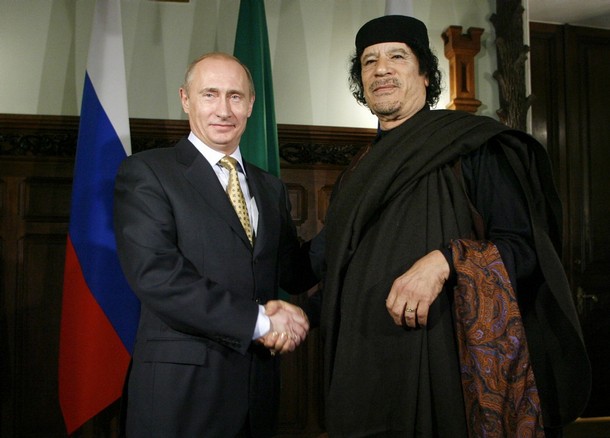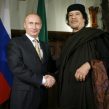
Moscow Positioning To Exploit Libya Stalemate
Publication: Eurasia Daily Monitor Volume: 8 Issue: 78
By:

The United States and Western Europe’s residual military powers have undertaken in Libya another war of choice. Russia ushered them into it by not vetoing the UN Security Council’s resolution that authorized the intervention. The conflict quickly turned into a stalemate, which Russia is now positioning to exploit.
Russian President Dmitry Medvedev has warned the US and NATO against “exceeding the [Security Council] resolution’s mandate. The resolution must be observed, not interpreted abusively as certain countries have done,” Medvedev admonished, adding “What did we concede, in voting for the resolution? A no-fly zone. [But] we got essentially a military operation, not on the ground for the time being, but from the air. And NATO has joined it as a military bloc. But the resolution contains nothing about this. It is a dangerous turn of events. What we see is the misuse of powers laid down in resolution 1973” (Interfax, April 14; www.kremlin.ru, April 18).
In the same statement, made during the BRICS summit in China, Medvedev staked out Russia’s position on managing the conflict in Libya as follows: a ceasefire among the local forces; their separation by an [unspecified] external force; negotiations toward a political-diplomatic solution, as distinct from a military solution; support for the African Union’s ceasefire proposal (which Colonel Muammar Gaddafi accepted while the insurgents rejected it); and continuing consultations on Libya within the UN Security Council (Interfax, April 14).
The Kremlin takes a pragmatic position on regime change in Libya. According to Medvedev, “Muammar Gaddafi has carried out a great many actions, including some that can potentially be interpreted as crimes. Someone [i.e, Gaddafi] might have to take a fateful personal decision to leave. This would be useful in all respects” (Interfax, April 12). Meanwhile, regime change has become a top political objective of the Western belligerents. Moscow’s official statements, however, refer even-handedly to “the opposing sides,” “Tripoli and Benghazi,” or “Tripoli and the insurgent forces” in Libya’s civil war (Interfax, April 12 – 19). Thus, Russia does not press for regime change, but is signaling that it can negotiate its support for such a change.
In line with Medvedev’s position, Russia’s Ministry of Foreign Affairs calls for “strict compliance” with resolution 1973, “avoiding the use of force” [by the US and NATO]; an “immediate ceasefire” between the two Libyan sides; and political dialogue between them under African Union mediation, while “all actions by states and international organizations should be considered by the UN Security Council” (www.mid.ru, April 14, 15; Interfax, April 18).
Russia’s Foreign Affairs Minister, Sergei Lavrov, used the NATO-Russia Council ministerial meeting on April 15 in Berlin to criticize NATO’s involvement in Libya. He reproached Allies for using force beyond the UN Security Council resolution’s mandate, pursuing regime change without a corresponding mandate, and causing civilian casualties through air strikes. Repeatedly he warned that arming or training the insurgents would be treated by Russia as “violations of the UN Security Council resolution.” Lavrov called for an “immediate ceasefire” and shift of focus toward a political and diplomatic settlement in Libya (Interfax, April 15).
Along with these strictures, however, Lavrov welcomed NATO Secretary-General Anders Fogh Rasmussen’s submission of a “detailed report,” to be discussed in the UN Security Council, about how NATO implements the Council’s resolution 1973 on Libya. According to Lavrov, this will enable the Security Council to develop a “unified position” [i.e., one dependent on Russia’s consent] on whether this NATO operation is consistent with the UN mandate, and what steps may be necessary to ensure NATO’s strict observance of the UN mandate (Interfax, April 15; www.mid.ru, April 19).
Moscow must value Rasmussen’s decision to submit such a report to the Security Council, as a precedent to be invoked in the future. Russia seeks to establish the principle that NATO cannot legitimately act without UN Security Council approval, which would necessitate Russia’s approval. “The Security Council will render its collective judgment,” Lavrov intoned. If so, veto-wielding Russia will join those sitting in judgment over the NATO alliance. Moscow is interested in drawing NATO into a long-term process of erosion of authority. Russia’s verdict may even be clement in the initial stage, so as to encourage continuation of such a process.
Russia’s envoy to NATO, Dmitry Rogozin, has accused NATO of causing itself a “humanitarian crisis” through air strikes on Libya’s civilian infrastructure. Rogozin warned that any arms supplies to insurgents or ground operations, “which will presumably be portrayed as humanitarian,” would violate the Security Council’s resolution on Libya. He noted the “internal split within the NATO alliance, [which] could subsequently lead to a profound political crisis,” resulting from the Libya operation. Addressing NATO’s European member countries involved in this operation (most are not directly involved), Rogozin warned that they are “slowly but surely being drawn into a new big war” (RIA Novosti, April 18, 19).
Four weeks into the air strike campaign, Moscow is adopting a pose of more-humanitarian-than-thou vis-à-vis the Western belligerents. Deploring civilian deaths and destruction of infrastructure, particularly from “massive strikes by coalition forces,” Russia’s Foreign Affairs Ministry is urging all sides to observe international humanitarian law and the UN resolution’s mandate to “protect the population” of Libya (Interfax, April 18).
On April 15, US President Barack Obama, British Prime Minister David Cameron, and French President Nicolas Sarkozy jointly published a column syndicated in the European press, declaring that Gaddafi’s renunciation of power is a preliminary condition for a political solution to the conflict. While the Kremlin ponders its response, Lavrov has retorted that “those who use the adopted resolution to justify regime change are manifestly violating the UN Security Council’s mandate.” Moscow seems prepared to differentiate between externally-driven regime change and Gaddafi’s personal departure, opposing the former but amenable to the latter. As Lavrov restated, Russia insists on a negotiated solution involving both parties to the Libyan conflict (Interfax, April 19).
Russia has officially endorsed the BRICS’ and African Union’s calls to maintain Libya’s territorial unity. However, Russia is not repeating such calls in its own name. Thus, Moscow seems flexible about a possible de facto partition of Libya, which is being discussed informally in the West as a sub-optimal possible result of this military intervention. For its part, Russia is urging an immediate cease-fire in place and a mediated dialogue between Tripoli and Benghazi. Such an approach can lead to an unofficial partition of the country.




